12th October 2023
In recent years, the importance of physical literacy in primary schools has gained recognition, and the UK government's "60 Minutes a Day" guidelines for children underscore its significance.
Here, we delve into the concept of physical literacy, its vital role in primary education, and how the UK government's guidelines are making a positive impact.
Importance of Physical Literacy in Primary Schools
- Holistic Development: Physical literacy contributes to the holistic development of children. It promotes physical, cognitive, and emotional growth by enhancing motor skills, spatial awareness, problem-solving abilities, and self-confidence. A physically literate child is more likely to excel in various aspects of life.
- Lifelong Health Benefits: Early exposure to physical literacy sets the foundation for a lifetime of physical activity. Children who develop these skills are more likely to lead active and healthy lives, reducing the risk of obesity, chronic diseases, and mental health issues later in life.
- Academic Performance: Research has shown a strong link between physical activity and academic achievement. Regular physical activity improves concentration, memory, and problem-solving skills, leading to better academic performance in primary school and beyond.
- Social Skills: Physical literacy promotes teamwork, cooperation, and communication skills, which are essential for building positive relationships and contributing to a supportive learning environment in primary schools.
- Confidence and Self-Esteem: As children master physical skills, they gain confidence in their abilities, leading to increased self-esteem. This confidence can positively impact their overall well-being and academic success.
The UK Government's 60 Minutes a Day Guidelines
To emphasise the importance of physical literacy and encourage regular physical activity among children, the UK government introduced the "60 Minutes a Day" guidelines.
These guidelines recommend that children engage in at least 60 minutes of moderate to vigorous physical activity every day. This could include activities such as running, dancing, use of outdoor gym equipment or playing team sports.
The guidelines are designed to ensure that children meet their recommended daily physical activity levels, helping them develop physical literacy and maintain good health.
The "60 Minutes a Day" guidelines are supported by several key initiatives and policies:
- School Physical Education: Primary schools in the UK are encouraged to provide high-quality physical education (PE) as a core part of the curriculum. PE lessons help children develop essential movement skills and enjoy physical activities. As part of PE lessons, Fresh Air Fitness has been working with schools for more than 10 years to provide an end to end service from installation of their outdoor gym equipment, to support on use of equipment, maintenance and a fantastic range of resource packs and lesson planners which are free to download or print off.
- Daily Mile: The Daily Mile initiative encourages primary school children to walk or run for 15 minutes each day, regardless of weather conditions. It promotes regular physical activity and provides a break from classroom learning.
- Active Travel: Schools are encouraged to promote active travel options, such as walking or cycling to school, to help children incorporate physical activity into their daily routines.
- After-School Clubs: Many primary schools offer after-school clubs that focus on sports and physical activities, providing additional opportunities for children to meet the 60-minute daily activity goal. Often the after school sports clubs are also free to attend.
- Support for Teachers: The government provides funding resources such as the PE and Sport Premium as well as training for teachers to help them deliver effective PE lessons and promote physical literacy in their schools.
Impact of the Guidelines
The "60 Minutes a Day" guidelines have had a positive impact on primary education in the UK in the following ways:
- Increased Awareness: These guidelines have raised awareness among parents, teachers and policymakers about the importance of physical activity for children's health and well-being.
- Improved Health: Children who meet the recommended daily activity levels are more likely to maintain a healthy weight, develop strong bones and muscles, and reduce the risk of chronic diseases.
- Enhanced Academic Performance: Regular physical activity has been linked to improved concentration, classroom behaviour and academic achievement, contributing to overall academic success.
- Greater Physical Literacy: By encouraging 60 minutes of daily activity, the guidelines have helped children develop essential movement skills and become more physically literate.
Fresh Air Fitness Outdoor Gyms
Fresh Air Fitness is an award-winning provider of outdoor fitness equipment and child-sized outdoor gyms. These innovative outdoor gyms are designed to engage Primary school aged children in fun and fitness, promoting physical literacy and overall well-being.
The Children's range of outdoor gym equipment from Fresh Air Fitness feature a wide range of age-appropriate exercise products, including scaled-down versions of traditional adult machines, such as arm and pedal bikes, cross trainers and rowing machines. This outdoor gym equipment is specifically tailored to children's needs and abilities, making exercise enjoyable and accessible for children with all levels of fitness.
About Us
Since 2007, we have installed over 4,500 outdoor gyms nationwide and our team of experts provides an end-to-end service from initial site visit to design, delivery, and installation.
We project-manage your outdoor gym project from inception to completion and provide full after sales care through our dedicated team of outdoor gym specialists – including providing a dedicated telephone number post installation so all customers have a direct point of contact.
To explore some of our success stories to date visit: www.freshairfitness.co.uk/success-stories
Back to all blog posts

